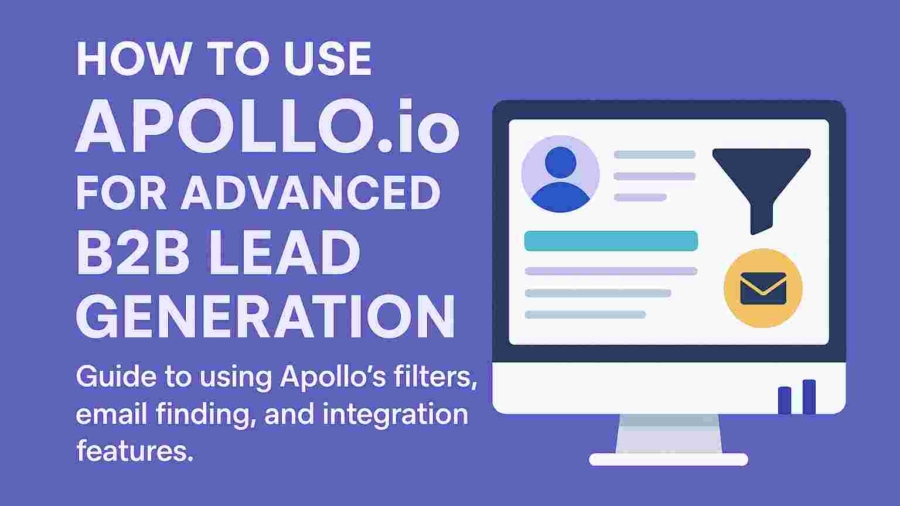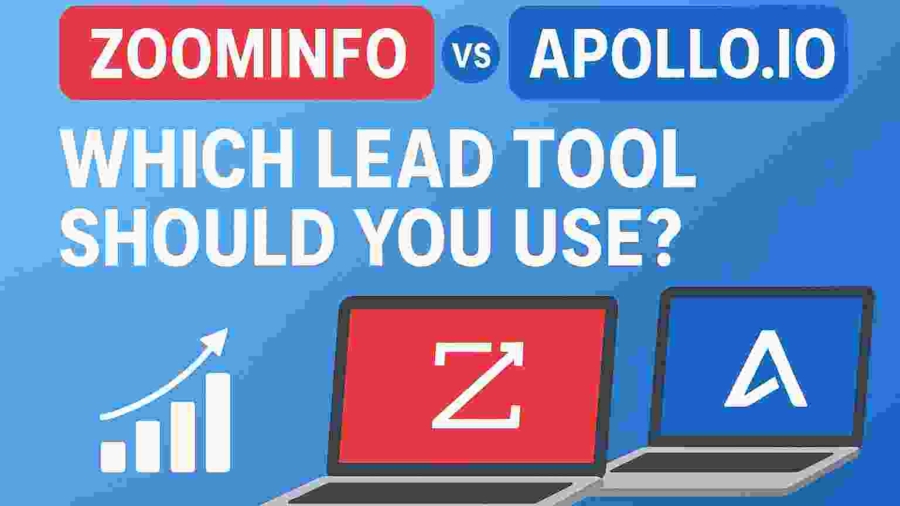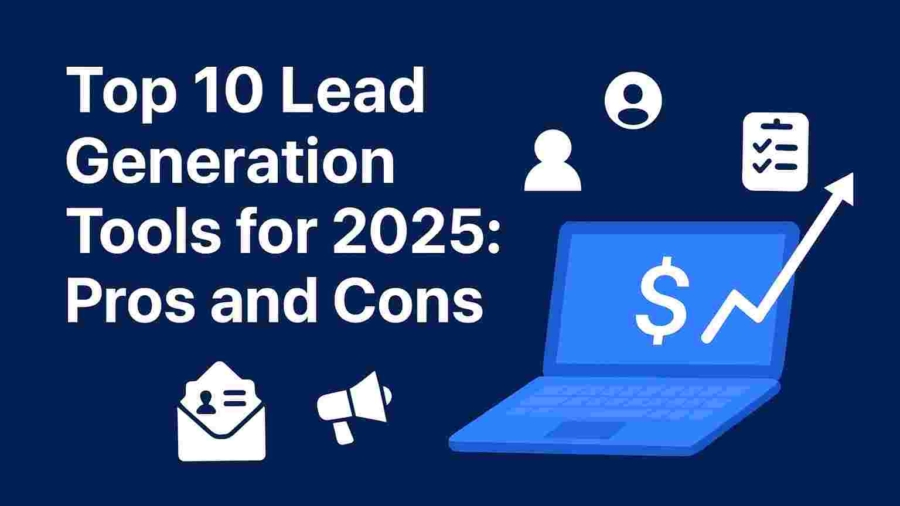Introduction to Apollo.io
If you’re in B2B sales, you already know how hard it can be to find the right leads. That’s where Apollo.io steps in. It’s not just another lead generation tool—it’s an all-in-one sales intelligence and engagement platform. With access to over 275 million contacts, verified emails, and deep filtering options, Apollo helps sales teams reach decision-makers faster.
So, why is Apollo.io a game-changer? Because it combines data, outreach, and automation in one place. Instead of juggling five different tools, you can streamline your prospecting with Apollo.io.
Getting Started with Apollo.io
Creating an Account
Signing up for Apollo.io is simple. You can start with their free plan to test the waters or jump into a paid plan for full access.
Navigating the Dashboard
The dashboard is clean and intuitive. You’ll find options for search, lists, sequences, enrichment, and analytics right on the left-hand menu.
Understanding Apollo.io’s Core Features
Contact Database Overview
Apollo.io gives you access to millions of B2B contacts worldwide, complete with company insights, tech stack details, and verified emails.
Search and Filter Functionality
Their advanced filters make it easy to narrow down prospects based on specific criteria like job titles, industries, or revenue.
Email Finding and Verification
Apollo.io doesn’t just scrape emails—it verifies them. This ensures lower bounce rates and higher deliverability.
CRM and Tool Integrations
The platform integrates with Salesforce, HubSpot, Pipedrive, Outreach, Zapier, and more, so your workflow stays seamless.
Setting Up for Lead Generation Success
Defining Your Target Audience
Before diving in, get clear on your Ideal Customer Profile (ICP). Who are you selling to? What industries do they belong to?
Creating Ideal Customer Profiles (ICP)
Apollo.io allows you to save search filters as ICPs, making it easy to target the right decision-makers again and again.
Building Segmented Lists
Organize your leads into segmented lists for personalized outreach and better response rates.
Using Apollo.io Filters for Precise Targeting
Industry and Company Size Filters
Find companies that match your niche, whether you’re targeting startups or Fortune 500 firms.
Location-Based Targeting
Want leads only in New York or London? Apollo.io’s location filters make it easy.
Seniority and Job Title Filters
Target CEOs, CMOs, VPs, and Directors directly without wasting time on irrelevant contacts.
Technology and Funding Filters
Search for companies that use specific technologies or recently raised funding perfect for catching businesses in a growth stage.
Email Finding & Verification with Apollo.io
Apollo.io’s email finder is one of its strongest features. With built-in verification, you can trust the email addresses you pull.
Best Practices
- Always export in small batches.
- Verify before launching big campaigns.
- Warm up your sending domain to avoid spam.
Enrichment & Prospect Intelligence
Apollo.io doesn’t just give you raw data it enriches your CRM with insights like:
- Recent company news
- Hiring trends
- Funding updates
- Tech adoption signals
This intelligence makes your outreach more relevant and timely.
Sales Engagement with Apollo.io
Sequences and Automated Campaigns
Build multi-step email and LinkedIn sequences directly inside Apollo.io.
Crafting Personalized Outreach
Add dynamic variables like first name, job title, or company name to make every email feel personal.
Tracking Engagement and Analytics
Apollo.io lets you monitor open rates, reply rates, and click-throughs so you can optimize campaigns.
CRM and Workflow Integrations
Apollo.io connects seamlessly with popular CRMs:
- Salesforce
- HubSpot
- Pipedrive
- Zoho CRM
This means no more manual copy-paste—your leads sync automatically.
Advanced Lead Generation Strategies with Apollo.io
- Combine email + LinkedIn + phone outreach for better conversions.
- Use Apollo’s built-in dialer to connect instantly.
- Leverage AI-powered recommendations for smart prospecting.
Common Mistakes to Avoid in Apollo.io
- Don’t rely solely on automation always add a human touch.
- Keep your lists clean and updated.
- Don’t spam hundreds of leads at once; focus on quality.
Apollo.io vs Other Lead Generation Tools
- Apollo.io vs ZoomInfo – Apollo.io is cost-effective, but if you want verified premium data, check out ZoomInfo List.
- Apollo.io vs Lusha – Apollo offers deeper filters and engagement features.
- Apollo.io vs LinkedIn Sales Navigator – Apollo provides verified emails, while LinkedIn focuses on connections.
Maximizing ROI with Apollo.io
Track your success using key metrics like:
- Cost per lead
- Response rate
- Conversion rate
Then tweak campaigns for higher ROI.
Tips & Best Practices for Using Apollo.io
-
Warm up email accounts before large campaigns.
-
A/B test subject lines for higher open rates.
-
Always follow up most deals close after 5+ touches.
Conclusion
Apollo.io is more than just a database it’s a powerful sales engagement and intelligence platform. From finding verified emails to running automated campaigns, Apollo.io simplifies the entire lead generation process.
If you want to stay ahead in B2B sales, using Apollo.io strategically can make a massive difference in your pipeline growth.
FAQs
1. Is Apollo.io better than ZoomInfo for B2B leads?
Apollo.io is cost-effective, while ZoomInfo (see ZoomInfo List) offers enterprise-grade data accuracy.
2. How accurate are Apollo.io’s emails?
Most Apollo.io emails are verified, but it’s best to test in small batches first.
3. Can I integrate Apollo.io with LinkedIn?
Yes, you can use Apollo.io’s Chrome extension to extract LinkedIn contacts.
4. What’s the cost of Apollo.io?
Apollo.io has both free and paid plans, starting at affordable monthly rates.
5. Is Apollo.io suitable for small businesses?
Absolutely! It’s budget-friendly and scales as your business grows.



